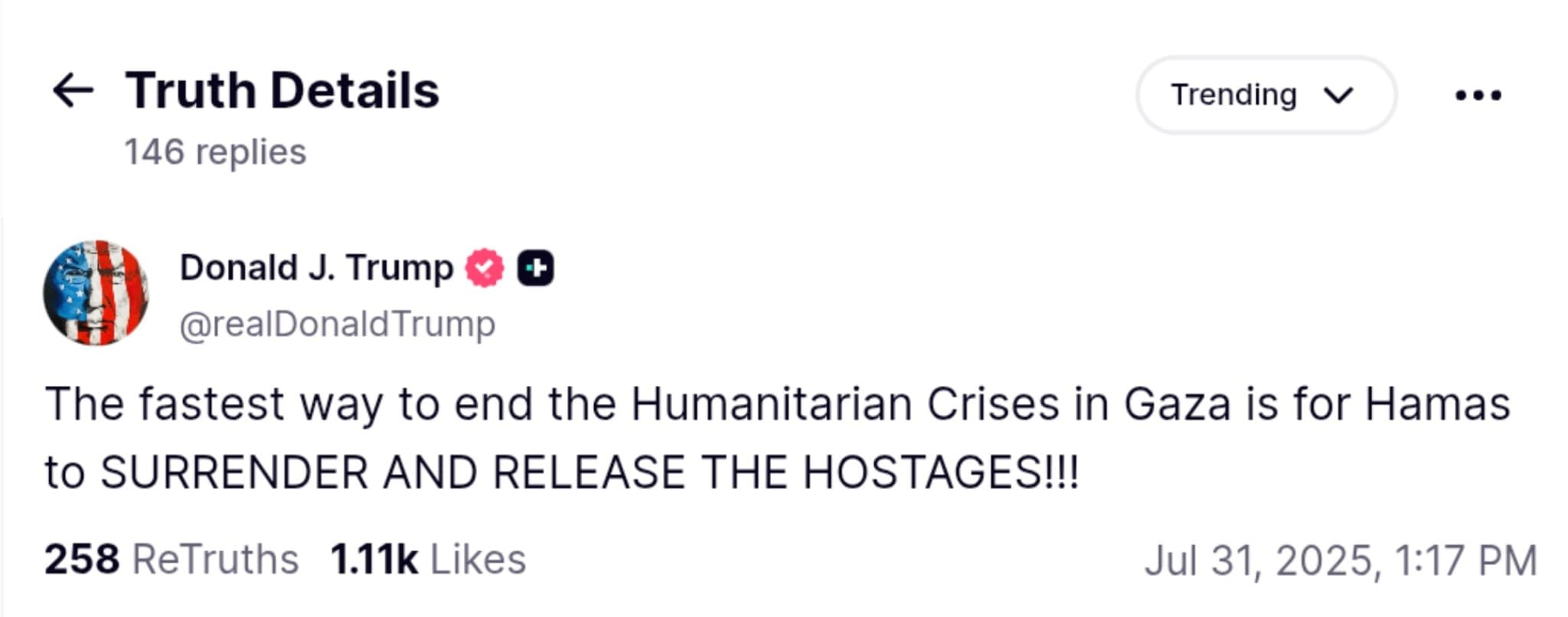Trump Urges Hamas to Surrender to End Gaza Humanitarian Crisis and Free Hostages
In a bold statement, U.S. President Donald Trump has called for an immediate surrender of Hamas to alleviate the ongoing humanitarian crisis in Gaza. The former president emphasized that the quickest path to restoring peace and safety for civilians in the region is for Hamas to release hostages and cease hostilities. His remarks come amid escalating tensions and dire humanitarian conditions that have drawn international scrutiny and concern.
Background & Context
The humanitarian situation in Gaza has reached critical levels, with reports of widespread shortages of food, water, and medical supplies exacerbated by ongoing conflicts. As previously reported, the region has been embroiled in violence that has resulted in thousands of casualties and displacement of civilians. The recent escalation in hostilities has put significant pressure on humanitarian organizations and governments worldwide to intervene and provide relief.
Trump"s comments are significant not only because of his role as a former president but also due to the influence he continues to wield in U.S. politics. His statement reflects a growing frustration among many international leaders regarding the lack of progress in resolving the conflict. The urgency of his message resonates with the broader calls for peace and stability in tumultuous regions, similar to the recent developments in Somalia, where efforts are being made to establish stability amid territorial disputes.
Key Developments
During a press briefing, President Trump stated, "The fastest way to end the humanitarian crisis in Gaza is for Hamas to surrender and release the hostages!" This statement underscores the complexity of the situation, as Hamas has been criticized for its tactics and the ongoing violence it perpetuates. Trump"s call for action comes at a time when the international community is increasingly vocal about the need for accountability and a clear path forward for peace negotiations.
In addition to Trump"s comments, various humanitarian organizations have reiterated the need for immediate action to address the crisis. They highlight the plight of civilians caught in the crossfire and emphasize the importance of dialogue and negotiation. The urgent need for hostages to be released has become a focal point of international discussions, with many calling for a ceasefire to facilitate humanitarian aid.
Broader Impact
The implications of Trump"s statement extend beyond the immediate humanitarian concerns. Analysts suggest that his remarks could influence U.S. foreign policy and shape the narrative around the Israel-Palestine conflict. As previously reported, the geopolitical landscape in the Middle East is fraught with instability, and Trump"s call for Hamas to surrender may resonate with those advocating for a stronger U.S. role in mediating peace.
Experts also draw parallels between the current situation in Gaza and other regions facing similar crises. For instance, Ukraine"s President Volodymyr Zelensky has recently called for global action to address the ongoing conflict with Russia, highlighting the need for international solidarity in confronting aggressive military actions. This broader context emphasizes the interconnectedness of global conflicts and the urgent need for diplomatic solutions.
What"s Next
As the situation in Gaza continues to evolve, the international community will be closely monitoring developments in response to Trump"s statements. There are calls for a coordinated approach to address the humanitarian needs while also pressing for a political resolution to the conflict. The U.S. administration may face pressure to take a more active role in negotiations, potentially leveraging its influence to facilitate dialogue between conflicting parties.
In the coming weeks, further actions may be anticipated from both the U.S. and international bodies, aimed at addressing the humanitarian crisis and promoting peace. The situation remains fluid, and the response from Hamas, as well as other regional actors, will be critical in determining the next steps. Observers are keenly watching how these developments unfold and what measures will be taken to ensure the safety and security of civilians in Gaza.



![[Video] Gunfire between Iraqi security forces and Sadr militias in Baghdad](/_next/image?url=%2Fapi%2Fimage%2Fthumbnails%2Fthumbnail-1768343508874-4redb-thumbnail.jpg&w=3840&q=75)
